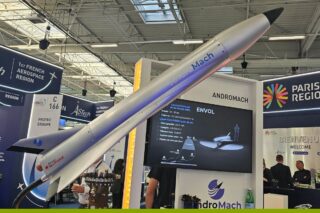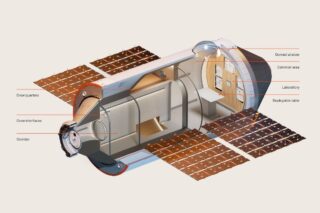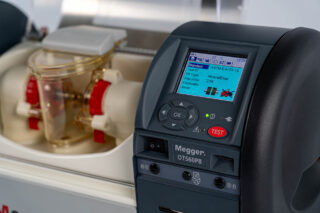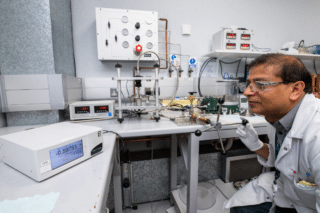Globe Fuel Cell Systems is an innovative German start-up that specializes in the development of cutting-edge fuel cell systems for industrial use, which are completely emission-free and digitally networked. Although their product is not yet available on the market, the start-up has fully digitalized the manufacturing process. By leveraging the power of Ansys tools, they have been able to simulate and optimize their systems efficiently. At Hannover Messe 2023, we met Dr. Bernhard Wienk-Borgert, the CTO of Globe Fuel Cell Systems, who highlighted the importance of digital simulation for start-ups.
In 2019, a group of three experts in the field of fuel cell technology, including Dr. Bernhard Wienk-Borgert, the current CTO of Globe Fuel Cell Systems, came together at the fuel cell research department of Mercedes-Benz. Their shared mission was to create a sustainable solution that could help achieve carbon neutrality goals and make a positive impact on the planet, on the globe.
In 2020, they established Globe Fuel Cell Systems with a specific focus on developing custom hydrogen fuel cells and fuel cell systems for various industrial applications. While their product is still in the developmental phase, their use of Ansys’s simulation software has enabled them to digitally build and optimize their product efficiently.
Building the GLOBE XLP80 Using Ansys’s Software
At Hannover Messe 2023, we spoke with Dr. Bernhard Wienk-Borgert:
“When we established Globe in 2020, our aim was to create fuel cell generators that not only excel in energy density but also energy efficiency. To develop a complete fuel cell system from scratch, we had to carefully consider aspects such as thermal and fluid management, as well as airflow. As air plays a vital role in both fuel cell reactions and system cooling, we turned to Ansys for their expertise in CFD and FEM simulations, as well as mathematical calculations for airflow. The use of such software was crucial to our success, and we knew that Ansys could provide the solutions we needed in terms of fluid, thermal, and air management.”
To develop their fuel cell unit called GLOBE XLP80, Globe Fuel Cell Systems used Ansys’s HFSS and SIwave simulation software. Ansys helped Globe manage the cooling requirements and air requirements for the chemical reaction of the fuel cells.
They then used the software to implement the geometries, constraints, and requirements and to calculate the answers.
“The answers generally reflected what we had thought at the beginning. The major redesign steps came from changes in the geometry.”
The result is GLOBE XLP80, a fuel cell unit specially designed for use in intralogistics. It is a hybrid system that combines a fuel cell and lithium-ion battery drive for consistent power deliveries. The solution is expected to reduce downtimes and minimize the number of intralogistics vehicles, therefore contributing to achieving carbon neutrality goals as initially planned.
Their product is in the last phase of CE certification and will be brought to the market in autumn 2023. German OEMs in the intralogistics industry have already shown interest in the solution.
Speeding Development with Digital Simulation
If Globe Fuel Cell Systems was able to speed up the development of the GLOBE XLP80 and have a complete solution on the market in just 3 years it is thanks to digital simulation. By digitizing the complete system before putting the first screw, they were able to speed up the development process.
“As a startup, our goal is to rapidly develop our product. To achieve this, we need to leverage digital solutions to streamline our development cycles. At the outset, we won’t need to purchase individual components or testing capabilities, as we can build a solid foundation through the use of digital twin technology. By using this approach, we can accelerate our development process.”
The start-up was able to simulate every development process.
“When conducting simulations, starting on a small scale can facilitate scaling up. For instance, we can begin by simulating a tube and a sensor, then gradually increase the complexity by simulating the cathode and subsequently the entire fuel cell system in a compact package. Finally, we can simulate the integration of our system into the vehicle. By digitizing the complete system before buying the first physical component, we can significantly reduce the time and resources needed for development. Once the digital system is prepared, we can then proceed with physical implementation. This approach enables us to accelerate our development process.”
Simulation can also help them optimize their system’s performance.
“Our systems can be tested under various environmental conditions, such as the extreme driving conditions in Saudi Arabia where temperatures can reach up to 40° Celsius, and the freezing driving conditions in Norway where temperatures can drop down to -10° Celsius.”
Since 2020, CADFEM, a channel partner of Ansys, has been providing support to Globe. According to Josef Overberg, Head of Business Development at CADFEM,
“Startups often face resource constraints, such as limited personnel and financial resources, which can hinder their ability to develop and test their products effectively. In such cases, simulation can be a valuable tool for startups to leverage their expertise and ideas. By utilizing software to simulate various scenarios, startups can efficiently test their products and refine their ideas. This approach can help startups achieve their goals and overcome the challenges that come with limited resources.”
In addition to their current product development, Dr. Wienk-Borgert said Globe is also developing an IoT device that will send data to the cloud.
“This will enable us to compare real-time data with simulation data. By doing this, we will be able to verify if the simulation results match the outcomes on the ground with clients. This is the next step for Globe.”
Globe is also involved in development projects within the maritime industry. They are working to support power fuel cell systems that will generate 300 kilowatts of system power. The target completion date for this project is 2024.










